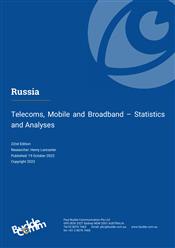Russia Telecoms Market Report
Telecoms, Mobile and Broadband - Statistics and Analyses

Russia scrambles to develop domestically made telecom hardware
The Russian telecom market is the largest in Europe, supported by a population of about 143 million. The overall market is dominated by the western regions, particularly Moscow and St Petersburg which are the main cities and economic centres. Many other regions in the east and north of the country were settled as part of government schemes during the Soviet period, aimed at creating population centres. The artificiality of these schemes created cities and towns which are unsustainable, and since the 1990s most of these settlements have seen dramatic population declines as residents have moved further east to European Russia. They not only remain a drain on Federal resources, but telcos have also been hard pressed to justify investing in areas of low population density.
All sectors of the telecom market have been liberalised, with competition most prevalent in the two largest regional markets. The incumbent state-owned telco Rostelecom, which absorbed most of the regional players, in late 2019 acquired the remaining 55% of Tele2 Russia which it did not already own.
At least in the more populated regions, telcos continue to deploy and modernise fixed-line network infrastructure to offer improved broadband services as well as a range of IP-delivered content. As a result, the fibre broadband sector has shown considerable growth, supported by the government’s program to extend the reach of broadband to outlying regions. By contrast, the number of DSL connections continues to fall as subscribers are migrated to fibre where available.
The development of 5G services has been stymied by the lack of spectrum. Although MNOs have licences to use 700MHz spectrum for 5G, this spectrum has yet to be released by broadcasters. Spectrum in the 3.4GHz range commonly used for 5G in Europe has been restricted for use in Russia by the military and intelligence agencies. Despite these limitations, the four principal MNOs each have an equal share in a joint venture, New Digital Solutions, aimed at developing a strategy to deploy 5G using shared network and spectrum assets. Another complication for 5G is that the main vendors, including Nokia and Ericsson, exited the country soon after Russia’s invasion of Ukraine. Although Chinese vendors such as Huawei and ZTE have the potential to fill some of the gaps, the threat of secondary sanctions against them complicates their involvement in this sector.
This report provides an overview of Russia’s mobile, fixed-line telecom, and IT markets. It includes information on key regulatory developments, data on fixed-line networks, and an assessment of telcos’ financial and operating performance. The report reviews the major mobile operators as well as technologies and mobile data, content and applications, and a variety of updated financial and operational statistics.
Key developments:
- MNOs contract domestic vendors for mobile network equipment and base stations.
- VEON exits Russia with the sale of its subsidiary VimpelCom.
- Government debunks rumours of Rostelecom’s potential acquisition of MegaFon.
- MTS expands 5G trials on Moscow Metro.
- Vodafone Group ends partner market agreement with MTS.
- Russian-manufactured 5G equipment to be made available for trials by 2025.
- MegaFon contracts vendors to develop its mobile infrastructure through to 2030.
- Report update includes the regulator's market data updates, telcos' financial and operating data to Q2 2023, regulator’s market data to Q1 2023, updated Telecom Maturity Index charts and analyses, recent market developments.
Companies mentioned in this report:
MegaFon, Tele2 Russia, Skylink, VEON, Volga Telecom, SMARTS Group, Uralsvyazinform, MTS, TransTeleCom, ER-Telecom, MTS, Rostelecom, PeterStar, Synterra Telecom, Comstar, Summa Telecom, MetroMAX, Comstar, Yota, Virgin Connect, Enforta, Golden Telecom
Related Reports
- Europe - Mobile Network Operators and MVNOs
- United Kingdom - Telecoms, Mobile and Broadband - Statistics and Analyses
- Ireland - Telecoms, Mobile and Broadband - Statistics and Analyses
- Poland - Telecoms, Mobile and Broadband - Statistics and Analyses
- Lithuania - Telecoms, Mobile and Broadband - Statistics and Analyses
- Czech Republic - Telecoms, Mobile and Broadband - Statistics and Analyses
- Switzerland - Telecoms, Mobile and Broadband - Statistics and Analyses
- Hungary - Telecoms, Mobile and Broadband - Statistics and Analyses
- Latvia - Telecoms, Mobile and Broadband - Statistics and Analyses
Share this Report
TMT Intelligence
A platform to scale your intelligence tasks
Monitor critical insights with our AI-powered Market Intelligence Platform gathering and analyzing intelligence in real time. With AI trained to spot emerging trends and detect new strategic opportunities, our clients use TMT Intelligence to accelerate their growth.
If you want to know more about it, please see:
Research Methodology
BuddeComm's strategic business reports contain a combination of both primary and secondary research statistics, analyses written by our senior analysts supported by a network of experts, industry contacts and researchers from around the world as well as our own scenario forecasts.
For more details, please see:
More than 4,000 customers from 140 countries utilise BuddeComm Research
Are you interested in BuddeComm's Custom Research Service?
Hot Topics
News & Views
Have the latest telecommunications industry news delivered to your inbox by subscribing to BuddeComm's weekly newsletter.